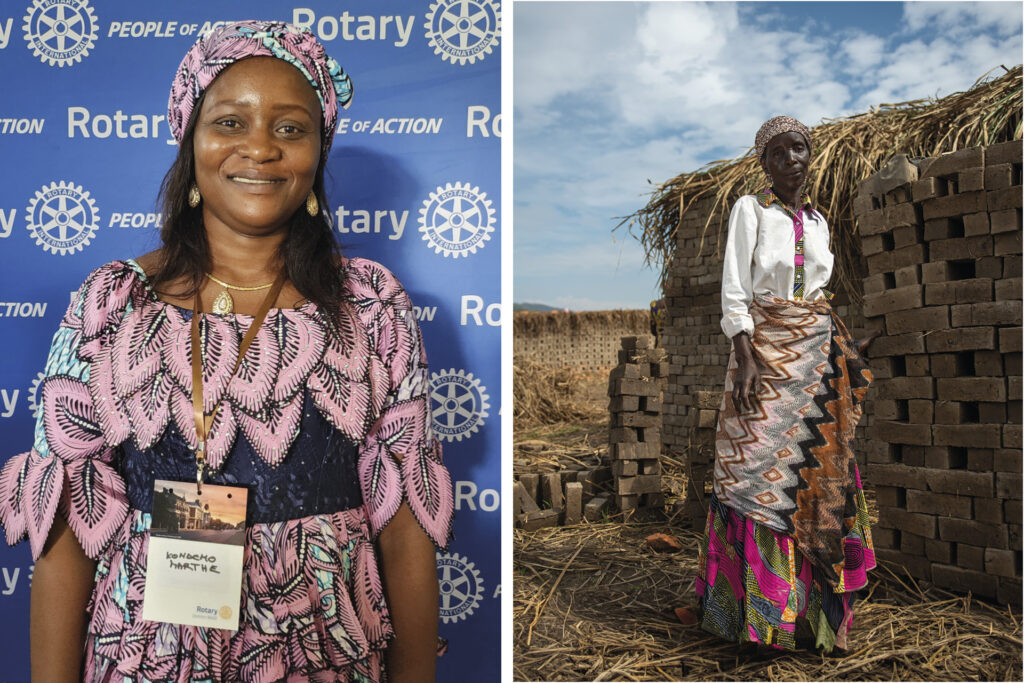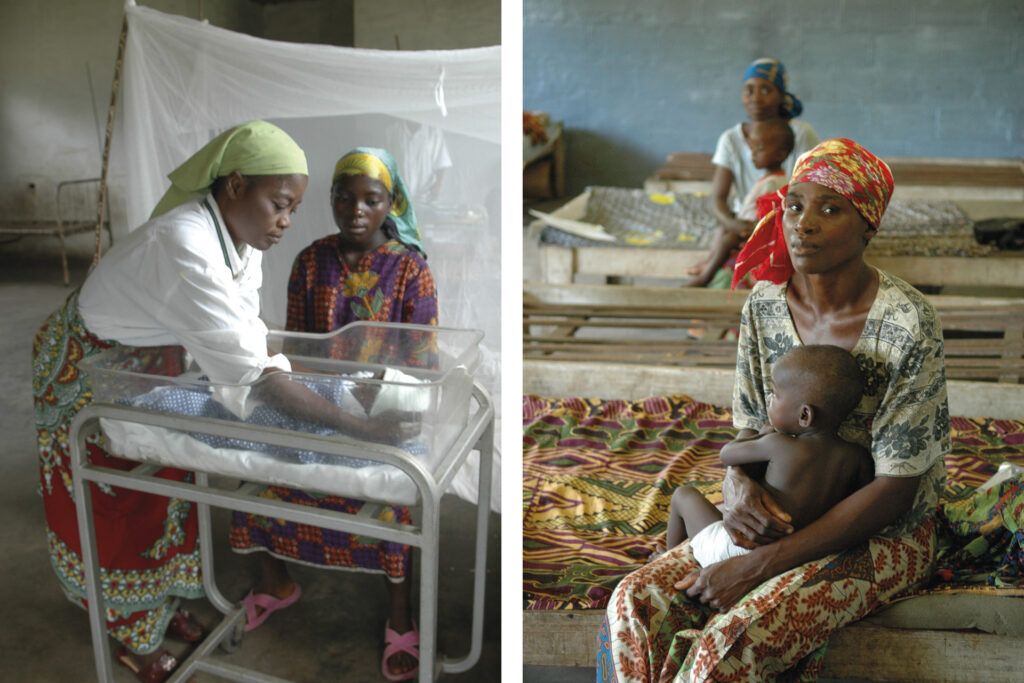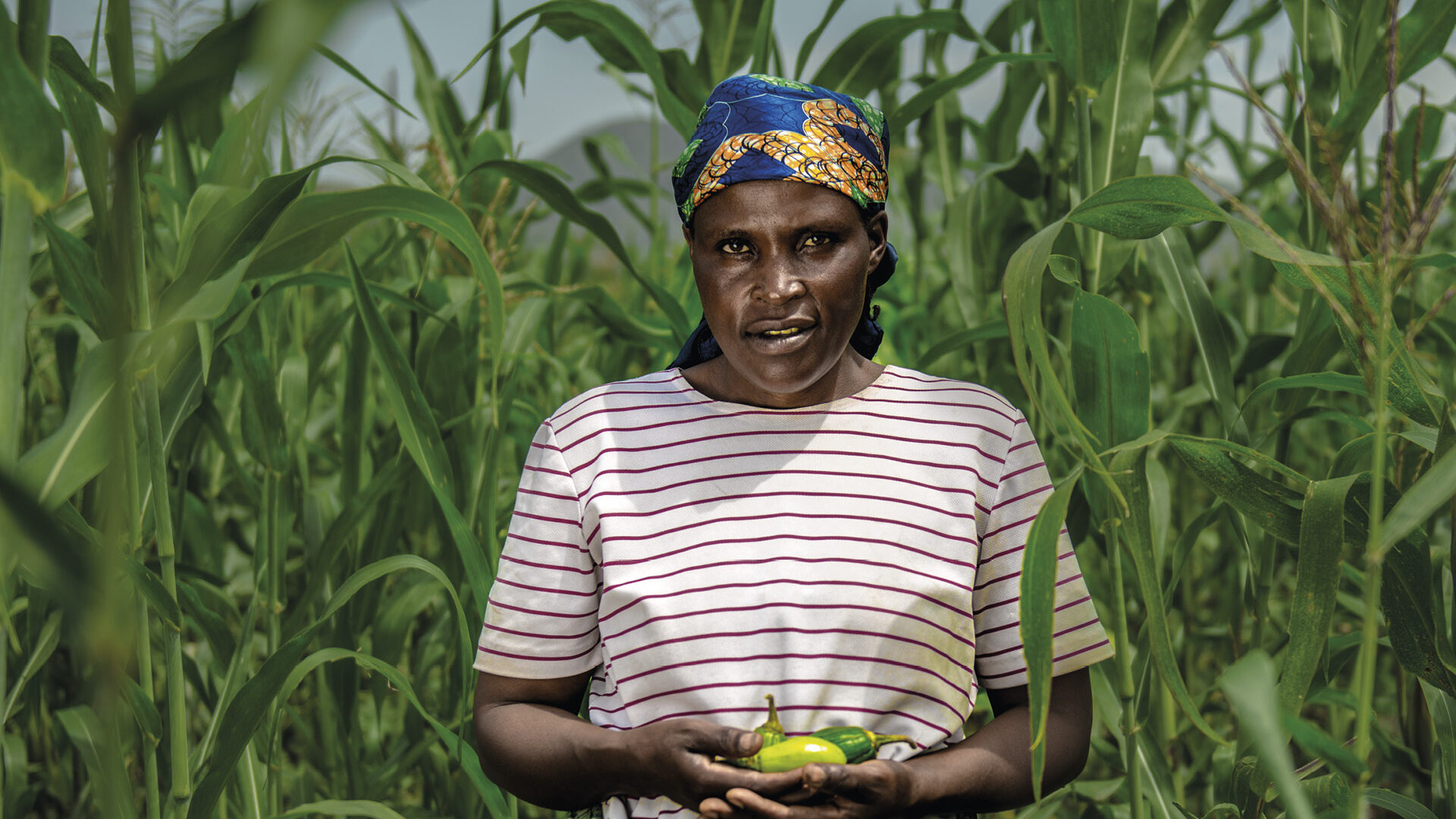Supported by a Royce and Jean Abbey Vocational Scholarship, Reverend Dr Marthe Kondemo is empowering women in the Democratic Republic of Congo’s least resourced and poorest provinces, some accessible only by canoe or dangerous forest paths.
Put life into Rotary – your life was Royce Abbey’s theme for his year as Rotary International president in 1988-89.
An Essendon, Victoria, native, Royce led Rotary through significant and lasting achievements. These included administering polio vaccinations in China, conducting a seminar that would become the first of the Rotary Peace Forums as we know them today, and removing the word ‘male’ from the criteria for Rotary membership.

PICTURED: (left) Royce and Jean Abbey Endowed Fund scholarship recipient Reverend Dr Marthe Kondemo. (Right) A Congolese brick maker.(Photo: Ryan Carter)
To commemorate their successful year, the district governors of 1988-89 established the Royce and Jean Abbey Endowed Fund within The Rotary Foundation, with the income designated to establish a vocational scholarship to benefit communities in developing nations. Since 2004, more than $500,000 has been contributed to the Endowed Fund through the Royce Abbey Award, which is presented by clubs to Rotarians showing enthusiasm and commitment to the Ideals of Rotary. To date, the scholarship has assisted 35 individuals to gain practical training in Australia, which is impacting entire communities.
This year, the first Congolese to benefit from the vocational scholarship was Reverend Dr Marthe Kondemo, 45, an academic and pastor who serves as the General Secretary for Women and Families of the National Church of Christ in the Democratic Republic of Congo. Her rural women stakeholders include 15 million women representing more than 100 Protestant denominations in a vast, diverse nation with a population of 104 million.
Marthe recently completed three months in New South Wales, hosted by the Royce and Jean Abbey Vocational Scholarship Committee, the Rotary E-Club of Greater Sydney and HandUp Congo, a small non-profit that facilitates initiatives in Congo through Rotary Australia World Community Service.
“My focus was on learning about innovative women’s health and economic livelihood models with the goal to identify ideas that might be replicated in the Democratic Republic of Congo’s context.”
“Marthe interpreted for our Australian volunteer team in 2023, including the planting of the first Rotary Peace Pole in Congo,” says Lucy Hobgood-Brown, president of HandUp Congo and a member of Rotary E-Club of Greater Sydney.
“When I learned about this scholarship opportunity, Marthe was the first person to come to mind. She not only speaks excellent English, essential for Australia, but she has many years of experience navigating challenging environments. She provided us with wise counsel on many occasions in Congo. She’s a natural leader.”
“My focus was on learning about innovative women’s health and economic livelihood models with the goal to identify ideas that might be replicated in the Democratic Republic of Congo’s context,” says Marthe.
“I feel so lucky to have been given this opportunity to meet Rotarians and community leaders who introduced me to so many amazing initiatives, from women’s refuges to team building strategies and how important it is to teach school children about environment protection. I compared Australia’s First Nations struggles with the Indigenous struggles in my country. We have much to learn from them, and from elders.”

PICTURED: (left) A midwife in the Congolese village of Lotumbe assists a newborn and his mum. (Photo: Ken Kobre). (Right) A new mum waits in the Lotumbe hospital for family to bring food and funds to pay the hospital fee. Accessible only by canoe or a dangerous forest path, Lotumbe is in the Democratic Republic of Congo’s least resourced and poorest province. (Photo: Ken Kobre)
A mother of five, Marthe says the lack of formal economic opportunities, combined with the legacy of entrenched political conflicts and instability, as well as high rates of malnutrition, illness, poor education and environment protection, make the Democratic Republic of Congo one of the hardest places on earth to raise a family.
“Thanks to the inspiring Australians that I met, I now have many experts I know I can count on for resources and support as I explore new ideas with women and families in our church network,” Marthe says. “My country needs a lot of help.”
One of Marthe’s priorities is to hold a Positive Peace workshop in November, to equip and empower women in DRC with the knowledge and tools to address their needs and improve social and economic participation, build social cohesion and community resilience.
The training of trainers will be focused on understanding and applying the Positive Peace framework as a tool for participant-led discussions and outcomes so the women can propose projects and interventions that meet their needs and foster peace in their c
This is a collaborative project with the Sydney-based Institute for Economics & Peace, Rotary and the Church of Christ in Congo.
If you would like to follow Marthe’s women’s empowerment initiatives, contact handupcongo@gmail.com.
To support her November leadership workshop, tax deductibility is available through www.rawcs.org.au, Project 47-2015-16, Building a Healthy Congo. Designate “MARTHE”.
For more information about the Royce and Jean Abbey Vocational Scholarship and the Royce Abbey Award, visit www.royceabbey.com.
MAIN PICTURE: Marlee Gallagher is a third-generation NSW grain farmer. After inheriting her family’s farm ‘Wallaringa’ at the age of 23 she became one of Australia’s youngest CEO farmers. This photograph is part of Museums Victoria’s Invisible Farmer Project Collection. The Invisible Farmer Project was the largest ever study of Australian women on the land, uncovering the histories and stories of Australian women in agriculture. (Photo: Catherine Forge for Museums Victoria)
